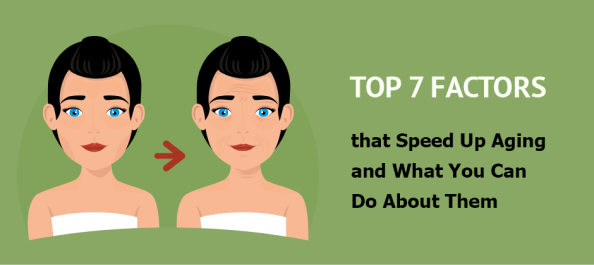
We have been told for decades that an increasingly sluggish metabolism is inevitable throughout the course of adulthood. But new research from Brighton University has blown that concept out of the water as data reveals the stunning truth. In the four decades from age 20 to 60, lifestyle factors are the main reason your metabolism slows down, causing you to lose muscle and gain weight, and setting you up for debilitating physical and metabolic disorders.
The good news is that you can start today to put the brakes on aging and throw the process in reverse. It is never too late to make the lifestyle changes necessary to restore good health, increase longevity and dramatically upgrade your quality of life.
Things That Make You Age
1. Being sedentary and overweight
Your body is designed to move, not sit in a chair for hours on end. The truth is, the less you move, the less energy you have, and the less inclined you are to get moving.
To end this vicious downward spiral, make a commitment to exercise on a daily basis, preferably at intervals throughout the day. You’ll feel happier, be more productive, sleep more soundly and have more energy. Regular exercise also corrects your posture, a key factor for looking, moving and feeling younger. Exercise may be hard at first, but it gets easier day-by-day.
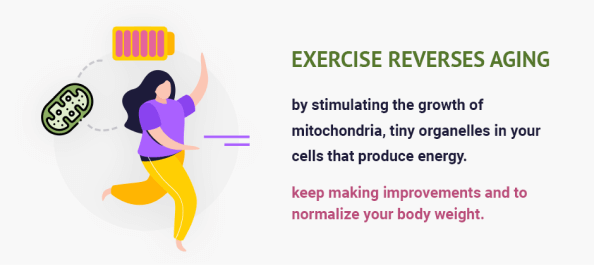
Exercise reverses aging by stimulating the growth of mitochondria, tiny organelles in your cells that produce energy. As exercise becomes easier, turn it up a notch to continue challenging yourself, to keep making improvements and to normalize your body weight. Include walking and resistance training in your weekly routine.
2. Skimping on sleep
Sleep is absolutely essential for good health. Yet sleep deprivation has reached epidemic proportions as people trade slumber for screen time. In addition, spending most of your time indoors divorces your body from natural circadian rhythms, causing you to toss and turn all night and wake up feeling sapped.
Inadequate sleep causes your mind and body to age because you are not giving it the time it needs to clear out toxins, repair and rebuild cells, and process the mounds of information your brain takes in each day. Over time, cumulative sleep deprivation affects your cognitive capacity, and sleep deficits have been tagged as key contributors to dementia and other neurological disorders. In fact, new research shows that getting less than 7 hours of sleep per night puts adults at 30% greater risk for Alzheimer’s disease.
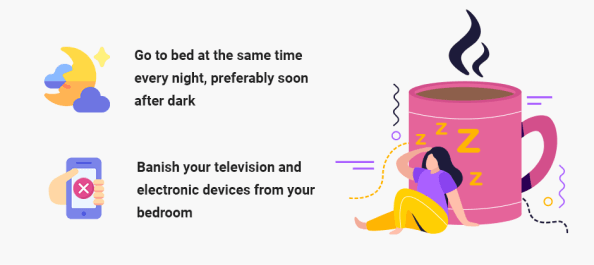
To get your sleep cycle back on track and restore restful slumber, go to bed at the same time every night, preferably soon after dark, and expose your body to early morning sunlight. Banish your television and electronic devices from your bedroom, and terminate screen time at least a half-hour before bedtime.
3. Not managing stress
Chronic stress is a key driving factor for weight gain, depression and metabolic disease. Stress keeps you in an elevated state of fight or flight that impairs your immune system and makes you look haggard. Chronic stress is linked to multiple types of cancer, heart disease, diabetes, hypertension and hyperlipidemia.
The first step in managing stress is to eliminate expendable stressors from your life. Start with the little things, like unfinished business, unpaid bills, messy living spaces, and tasks you keep procrastinating on. Just eliminating the clutter from your life and your environment can dramatically reduce your stress level. Next, tackle the big stuff, like finding a better job, moving to a nicer neighborhood, or having difficult discussions with loved ones that you’ve been putting off for too long.

Make time to exercise, meditate or simply engage in a favorite hobby or activity that takes your mind off your daily problems. Taking a break from life’s stressors on a regular basis gives you a fresh perspective and opens doors to new possibilities for a happier, healthier life. And remember to smile. Research shows that the mere act of smiling releases calming hormones that combat stress and make you look and feel younger.
4. Poor breathing habits
Respiration is vital to health and youthfulness, yet most of us take it for granted. Through your breath, you supply oxygen to your brain and to cells throughout your body, and you eliminate carbon dioxide and metabolic waste that would otherwise be toxic. Proper breathing ensures that all your cells get the oxygen they need to function at their best.
Breathing deeply through your nose stimulates the production of nitric oxide, a free radical that plays an important role in blood vessel endothelial health, and a critical element for blood pressure control. Low levels of nitric oxide are associated with erectile dysfunction, heart disease and diabetes.
Shallow breathing through your mouth deprives your cells of oxygen, making you feel sluggish and accelerating cellular aging. To optimize breathing, engage your diaphragm muscle to help draw your breath through your nose and into your body. Avoid breathing through your mouth, especially while sleeping, as it can keep you from getting a productive night’s sleep.
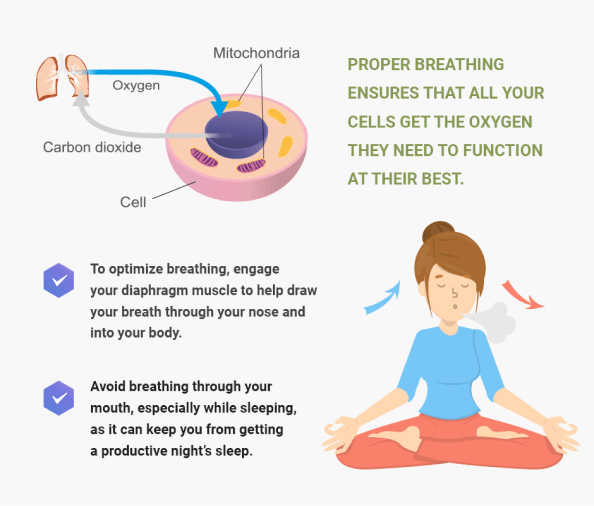
5. Not staying hydrated
Depending on your muscle mass and hydration status, your body is made up of 70-90 percent water. Your brain and heart are both about 75% water, your lungs are close to 85%, your muscles and kidneys are about 80%, and your skin is at least 65% water. Over 90% of your blood plasma is water, and even your bones contain upwards of 30% water.
A good massage therapist can tell if you’re dehydrated, just by how your muscles feel beneath your skin. And chronic dehydration promotes wrinkles because your skin cells become dry and depleted. Poor hydration affects your muscles, bones, connective tissues and nervous system. Being chronically dehydrated makes your blood sticky and sludgy, harms your vital organs and impedes the elimination of waste and toxins from your body. Simply put, chronic dehydration makes you old before your time.
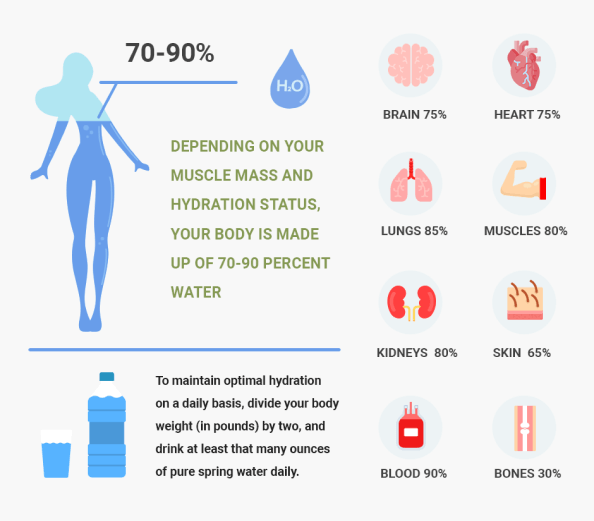
But there is more to hydration than just drinking water. You need an adequate intake of electrolytes to keep from over-diluting your body fluids. Hydration IV therapy is one way to optimize total body hydration by providing fluids infused with electrolytes. To maintain optimal hydration on a daily basis, divide your body weight (in pounds) by two, and drink at least that many ounces of pure spring water daily.
6. Eating sugar and processed food
Processed foods may satisfy your cravings and pacify your hunger pangs, but at the end of the day, processed foods and sugar are harmful to your health. They speed up aging, promote weight gain and invite metabolic disease to ravage your body. They deprive your cells of vital nutrients, replacing them with empty calories.
Simply eliminating sugar in the form of soda, coffee drinks, juices and snacks can dramatically transform your health profile and slow down the aging process. Sugar is a highly addictive substance, so you may experience withdrawal symptoms in the form of headaches and increased food cravings, but they will be relatively short-lived, disappearing in 2-3 days.
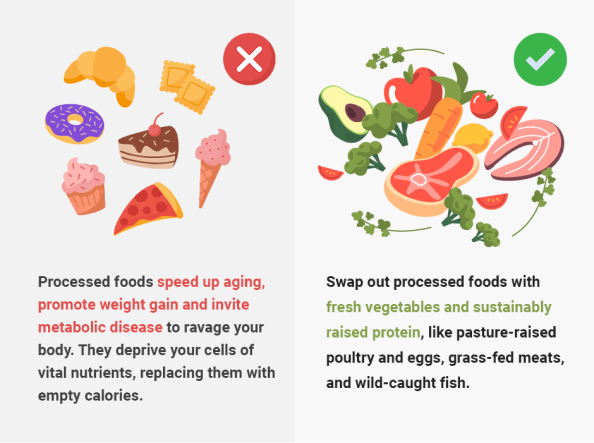
Swap out processed foods with fresh vegetables and sustainably raised protein, like pasture-raised poultry and eggs, grass-fed meats, and wild-caught fish. Practicing intermittent fasting reverses aging by giving your body a rest from food digestion and absorption. Fasting has been shown to elongate your telomeres, cellular markers for extended longevity. And intermittent fasting is one of the safest and most effective ways to lose weight.
7. Staying indoors
Your body needs fresh air and sunshine to thrive, yet many people spend all day, every day indoors, under artificial light. Your body manufactures its own Vitamin D, simply by being exposed to sunlight on a regular basis. Yet Vitamin D deficiency has reached epidemic proportions around the globe.
Vitamin D supports your immune system, builds strong bones, and plays a critical role in multiple metabolic functions. Exposure to sunshine elevates your mood and boosts your metabolism. And being outdoors in nature is good for your body, mind and spirit.
Make it a priority to get outdoors on a daily basis. Shun toxic sunscreen and use common sense — don’t sit in the sun until you burn to a crisp! If a hectic schedule or bad weather keeps you from getting enough sun exposure, consider supplementing with Vitamin D3.
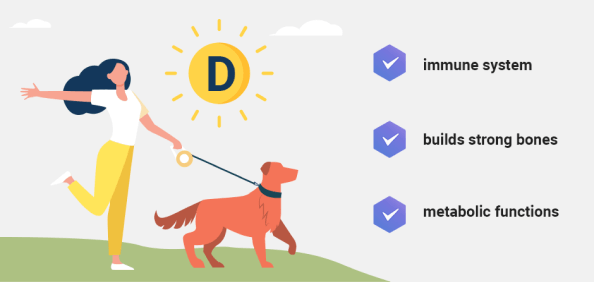
Take Action Now to Stop Aging in Its Tracks
There is a rapidly growing volume of research that contradicts the notion that our health is doomed to decline as we age. Two well documented evidence-based treatment approaches are shown to slow and reverse aging, and improve overall health.
- NAD+ is a coenzyme that your mitochondria need to produce energy. Cellular mitochondria are considered to be the key to healthy youthful cells throughout the body. Supplementing with NAD+ has been shown to lengthen telomeres and reverse the aging process in laboratory mice. NAD+ IV therapy is a fast and highly efficient way to deliver NAD+ to aging cells.
- Cryotherapy exposes your superficial cells to extreme cold, evoking a regenerative response that promotes cellular neogenesis. Cryotherapy promotes collagen production in the skin’s matrix, for smoother, more elastic skin. Periodic cold exposure can help you to lose weight, reduce chronic inflammation, improve sleep and combat aging.
Combining NAD+ therapy with cryotherapy, hydration therapy and positive lifestyle changes can help you look and feel younger, now and in the future.
Cryotherapy, Hydration Therapy and NAD+ Therapy in NYC
Advanced Cryo NYC is dedicated to keeping you young and healthy, all year round. We offer a broad range of IV nutrient cocktails and nutrient injections, along with whole body cryotherapy, localized cryotherapy and CryoFacial, to meet your body’s needs for optimal nutrition and robust health. Don’t get older, get better! Contact Advanced Cryo NYC today to schedule your next nutrient IV therapy or cryotherapy session.
Resources
González-Estévez, Cristina, and Ignacio Flores. “Fasting for stem cell rejuvenation.” Aging (Albany NY) 12.5 (2020): 4048.
Leng, Yue, et al. “Genetic risk of Alzheimer’s disease and sleep duration in non‐demented elders.” Annals of Neurology 89.1 (2021): 177-181.
Pontzer, Herman, et al. “Daily energy expenditure through the human life course.” Science 373.6556 (2021): 808-812.